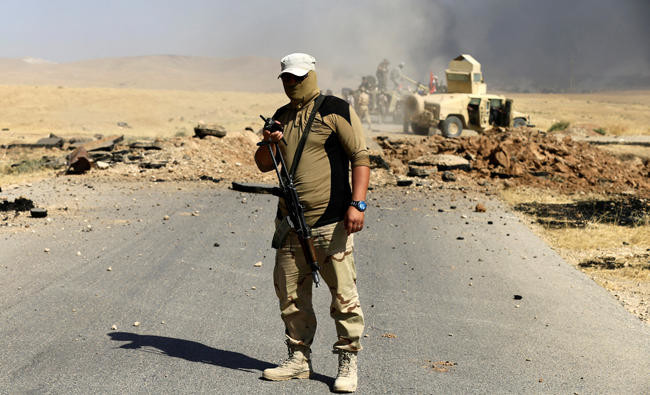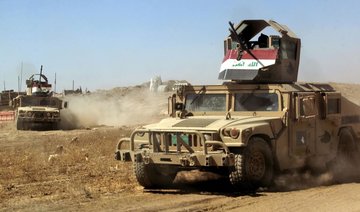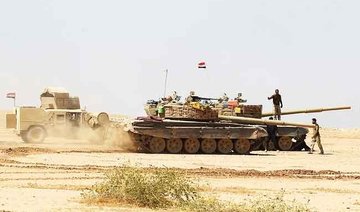BAGHDAD: Iraqi forces said they faced tough resistance on Monday from Daesh terrorists driven out of the city of Tal Afar to a small town where they had “nothing to lose” by fighting to the end.
An advance by the Iraqi army and Shiite paramilitary groups into Al-’Ayadiya was being slowed by snipers, booby-traps and roadside bombs, military officials said.
“The offensive started from two fronts in a bid to distract Daesh fighters,” army Lt. Col. Salah Kareem said.
“A total of four suicide bombers driving vehicles rigged with explosives attacked our troops under sniper cover. We had to slow down to avoid high casualty rates among our soldiers.”
Iraqi forces have in recent days recaptured almost all of the northwestern city of Tal Afar, long a stronghold of Islamic State. They have been waiting to take Al-’Ayadiya, 11 km northwest of the city, before declaring complete victory.
“Our intelligence shows that the most diehard Daesh fighters fled Tal Afar to Al-’Ayadiya,” Kareem said.
He said continuous air strikes and round-the-clock drone surveillance had prevented them fleeing to neighboring Syria.
“They have nothing to lose ... they will fight to the last breath,” Kareem said.
Daesh mortar rounds and sniper fire struck close to the advancing forces. The army hit back with tanks, heavy machine guns and mortars.
Up to 2,000 battle-hardened militants were believed to be defending Tal Afar against around 50,000 government troops last week. It was unclear how many were left in Al-’Ayadiya.
Many motorcycles carrying the Islamic State insignia had been abandoned at the side of the road outside Al-’Ayadiya.
Caliphate in ruins
If the fight for the town is proving surprisingly tough, the bigger battle for Tal Afar was easier than expected for Iraqi forces.
The city’s dramatic and rapid collapse after just eight days of fighting lent support to Iraqi military reports that the militants lack sturdy command and control structures west of Mosul.
Civilians who fled Tal Afar in recent weeks told Reuters of harrowing conditions in the city, where people had been surviving on bread and dirty water for months. Some militants had looked “exhausted” and “depleted,” residents said.
Tens of thousands of people are believed to have fled in the weeks before the battle started. A Reuters team saw no sign of civilians in the neighborhoods it toured on Saturday and Sunday.
Tal Afar became the next target of the US-backed war on the terrorist group following the recapture in July of Mosul, where it had declared its “caliphate” over parts of Iraq and Syria in 2014.
Mosul’s collapse effectively marked the end of the caliphate, but the group remains in control of territory on both sides of the Syrian-Iraqi border.
Iraqi forces face tough resistance in final Tal Afar battle
Iraqi forces face tough resistance in final Tal Afar battle

EU medical aid crosses into Syria from Turkiye

ISTANBUL: Some 55 tonnes of EU-funded medical supplies entered northwestern Syria from Turkiye on Thursday, a UN health official said.
Part of an EU air bridge to Syria, the supplies crossed Turkiye’s southern Cilvegozu border post and were taken to a warehouse in the northwestern city of Idlib, Mrinalini Santhanam of the World Health Organization said.
“There’s one more air bridge, and it is planned for February,” she said, adding that it was “still in the planning stages” with talks “to determine the volume and the scale.”
The supplies, distributed to Idlib and the Aleppo region health care centers, are part of an EU humanitarian bridge announced by Brussels on Dec. 13.
The aim is to support Syria’s battered healthcare system following the ouster of Bashar Assad on Dec. 8.
Included in the shipment were 8,000 emergency surgical kits, anesthetic supplies, IV fluids, sterilization materials, and medications to prevent disease outbreaks, the WHO said.
The civil war, which broke out in 2011, devastated Syria’s health care system, with “almost half of the hospitals (there) not functional,” WHO planning analyst Lorenzo Dal Monte said in late December.
He said the 50-tonne shipment from Dubai included “mainly trauma and surgical kits.”
Another five tonnes of supplies were brought in from another stockpile in Demark, including emergency health kits as well as winter clothing and water purification tablets, the WHO said.
Polish government to protect Israel's Netanyahu from arrest if he attends Auschwitz event

- It remains unclear if Netanyahu wanted to attend the event
- The Polish government vowed to ensure the safe participation of Israeli representatives
WARSAW: The Polish government adopted a resolution on Thursday vowing to ensure the free and safe participation of the highest representatives of Israel — including Prime Minister Benjamin Netanyahu — who choose to attend commemorations for the 80th anniversary of the liberation of Auschwitz-Birkenau later in January.
Netanyahu became an internationally wanted suspect last year after the International Criminal Court (ICC), the world’s top war crimes court, issued an arrest warrant for him in connection with the war in the Gaza Strip, accusing him of crimes against humanity over the death of more than 45,000 Palestinians, the majority of them women and children, since October 2023.
“The Polish government treats the safe participation of the leaders of Israel in the commemorations on January 27, 2025, as part of paying tribute to the Jewish nation,” read the resolution published by the office of Prime Minister Donald Tusk.
The government published the statement after Polish President Andrzej Duda asked Tusk to ensure that Netanyahu can attend without the risk of being arrested.
There had been reports suggesting that the ICC arrest warrant could prevent Netanyahu from traveling to Poland to attend observances marking the anniversary of the liberation in 1945 of the Auschwitz-Birkenau death camp by Soviet forces on Jan. 27.
Member countries of the ICC, such as Poland, are required to detain suspects facing a warrant if they set foot on their soil, but the court has no way to enforce that. Israel is not a member of the ICC and disputes its jurisdiction.
The court has more than 120 member states, though some countries, including France, have already said they would not arrest Netanyahu.
Hungarian Prime Minister Viktor Orbán even said he would defy the warrant by inviting him to Hungary.
It was not even clear if Netanyahu wanted to attend the event. The Polish Foreign Ministry said earlier Thursday that it has not received any information indicating that Netanyahu will attend the event.
US, French troops could secure Syria’s northern border, Syrian Kurdish official says

- Turkiye regards the YPG, which spearheads the US-allied Syrian Democratic Forces (SDF), as a terrorist group linked to Kurdish PKK militants
- Ilham Ahmed: ‘We ask the French to send troops to this border to secure the demilitarised zone, to help us protect the region and establish good relations with Turkiye’
PARIS: Talks are taking place on whether US and French troops could secure a border zone in northern Syria as part of efforts to defuse conflict between Turkiye and Western-backed Kurdish Syrian forces, a senior Syrian Kurdish official said.
Ankara has warned that it will carry out a cross-border offensive into northeastern Syria against the Kurdish YPG militia if the group does not meet Turkish demands.
Turkiye regards the YPG, which spearheads the US-allied Syrian Democratic Forces (SDF), as a terrorist group linked to Kurdish PKK militants who for 40 years have waged an insurgency against the Turkish state.
The SDF played an important role in defeating Daesh in Syria in 2014-17. The group still guards Daesh fighters in prison camps there, but has been on the back foot since rebels ousted Syrian President Bashar Assad on Dec. 8.
French President Emmanuel Macron said earlier this week that Paris would not abandon the SDF, which was one among a myriad of opposition forces during Syria’s 13-year-long civil war.
“The United States and France could indeed secure the entire border. We are ready for this military coalition to assume this responsibility,” Ilham Ahmed, co-chair of foreign affairs for the Kurdish administration in northern territory outside central Syrian government control, was quoted as saying by TV5 Monde.
“We ask the French to send troops to this border to secure the demilitarised zone, to help us protect the region and establish good relations with Turkiye.”
Neither France nor Turkiye’s foreign ministries immediately responded to requests for comment. The US State Department was not immediately available for comment.
It is unclear how receptive Turkiye would be to such an initiative, given Ankara has worked for years to secure its border against threats coming from Syria, and has vowed to destroy the YPG.
“As soon as France has convinced Turkiye to accept its presence on the border, then we can start the peace process,” Ahmed said. “We hope that everything will be settled in the coming weeks.”
A source familiar with the matter said such talks were going on, but declined to say how advanced or realistic they were.
Washington has been brokering ceasefire efforts between Turkish-backed groups and the SDF after fighting that broke out as rebel groups advanced on Damascus and overthrew Assad.
Addressing a news conference in Paris alongside outgoing US Secretary of State Antony Blinken, French Foreign Minister Jean-Noel Barrot hinted that there were talks on the issue.
“The Syrian Kurds must find their place in this political transition. We owe it to them because they were our brothers in arms against Islamic State,” Barrot said.
“We will continue our efforts ... to ensure that Turkiye’s legitimate security concerns can be guaranteed, but also the security interests of (Syria’s) Kurds and their full rights to take part in the construction in the future of their country.”
Blinken said it was vital to ensure that the SDF forces continued the job of guarding more than 10,000 detained Daesh militants as this was a legitimate security interest for both the US and Turkiye.
“We have been working very closely with our ally ... Turkiye to navigate this transition ... It’s a process that will take some time,” Blinken said.
The US has about 2,000 troops in Syria who have been working with the SDF to prevent a resurgence of Daesh.
A French official said France still has dozens of special forces on the ground dating from its earlier support of the SDF, when Paris provided weapons and training.
Macron to head to Lebanon after election of new president

- France “will continue to be at the side of Lebanon and its people,” Macron told Aoun in a telephone call
- France administered Lebanon for two decades after World War I and has maintained close ties even since its independence in 1944
PARIS: French President Emmanuel Macron on Thursday welcomed the “crucial election” by Lebanese lawmakers of army chief Joseph Aoun as president and said he would soon visit the country.
Macron spoke with the general hours after Aoun was announced as the leader to end a two-year vacuum in the country’s top post.
France “will continue to be at the side of Lebanon and its people,” Macron told Aoun in a telephone call, the French presidency said in a statement. Macron said he would go to Lebanon “very soon.”
“Congratulations to President Joseph Aoun on this crucial election,” Macron wrote on X earlier.
“It paves the way for reform and the restoration of Lebanon’s sovereignty and prosperity,” he added.
Aoun must oversee a ceasefire in south Lebanon and name a prime minister able to lead reforms demanded by international creditors to save the country from a severe economic crisis.
“The head of state indicated to President Aoun that France would support his efforts to quickly complete the formation of a government capable of uniting the Lebanese, answering their aspirations and their needs, and carrying out the reforms necessary for the economic recovery, reconstruction, security and sovereignty of Lebanon,” said the statement released after the telephone talks.
Macron also vowed support for the “national dialogue” that Aoun said he will launch and called on all groups to “contribute to the success of his mission,” the statement said.
France administered Lebanon for two decades after World War I and has maintained close ties even since its independence in 1944.
Israel rallies global support to win release of a woman believed kidnapped in Iraq

- The official said Thursday that the matter was raised in a meeting of special envoys for hostage affairs in Jerusalem this week
- Israel and Iraq do not have diplomatic relations
JERUSALEM: A senior Israeli official says the government is working with allies in a renewed push to win the freedom of an Israeli-Russian researcher who is believed to have been kidnapped in Iraq nearly two years ago.
The official said Thursday that the matter was raised in a meeting of special envoys for hostage affairs in Jerusalem this week.
He said the envoys met the family of Elizabeth Tsurkov and that Israel asked the representatives – from the US, UK, Germany, Austria and Canada – to have their embassies in Baghdad lobby the Iraqi government and search for a way to start negotiations. Israel and Iraq do not have diplomatic relations. He said he hopes other countries will help.
“We are counting on our allies,” the official said, speaking on condition of anonymity because he was discussing closed-door discussions. “And I hope that other nations will suggest assistance in helping us release Elizabeth. Many nations have embassies and contacts with the Iraqi government.”
Tsurkov, a 38-year-old student at Princeton University, disappeared in Baghdad in March 2023 while doing research for her doctorate. She had entered the country on her Russian passport. The only sign she was alive has been a video broadcast in November 2023 on an Iraqi television station and circulated on pro-Iranian social media purporting to show her.
No group has claimed responsibility for the kidnapping. But Israel believes she is being held by Kataib Hezbollah, an Iranian-backed Iraqi militia that it says also has ties to the Iraqi government.
The Israeli official said that after months of covert efforts, Israel believes the “changes in the region” have created an opportunity to work publicly for her release.
During 15 months of war, Israel has struck Iran and its allies, and Iran’s regional influence has diminished. Iraq also appears to have pressured militia groups into halting their aerial attacks against Israel.



















